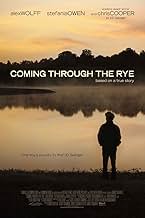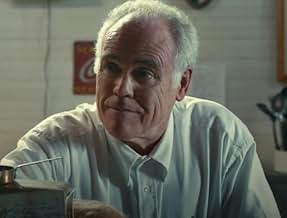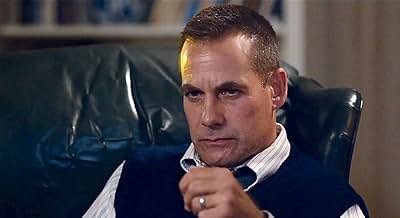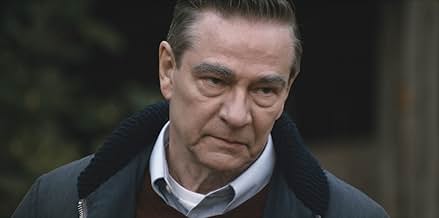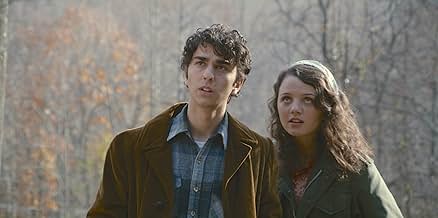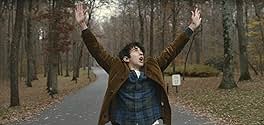IMDb RATING
6.2/10
1.1K
YOUR RATING
In 1969, the Holden Caulfield-obsessed Jamie Schwartz runs away from boarding school to find the reclusive author J.D. Salinger. Inspired by actual events, Jamie's search is a journey into t... Read allIn 1969, the Holden Caulfield-obsessed Jamie Schwartz runs away from boarding school to find the reclusive author J.D. Salinger. Inspired by actual events, Jamie's search is a journey into the meaning of friendship, love and loss.In 1969, the Holden Caulfield-obsessed Jamie Schwartz runs away from boarding school to find the reclusive author J.D. Salinger. Inspired by actual events, Jamie's search is a journey into the meaning of friendship, love and loss.
- Awards
- 12 wins & 3 nominations total
Stefania LaVie Owen
- Deedee
- (as Stefania Owen)
Melissa Lozoff
- Dot
- (as Melissa Ann Lozoff)
Robert C. Treveiler
- Dan
- (as Rob Trevelier)
Featured reviews
Many people will enjoy the crap out of this movie because of its angsty hero and the story of his perseverance in the face of a hostile world. The directional arc of this story is almost religious in its message of faith, of feeling chosen, of attempting to interpret the uninterpretable, and forcing yourself to push through the darkness. If that's what the movie had been about, it would have been an absolute masterpiece. Maybe I'm asking too much for a movie to be so aware of its message that its context and narrative go in that direction also.
Unfortunately, the movie is about the universal nature of the mythic Holden Caulfield character. The screenwriter has done exactly what Salinger told him not to do, to interpret the mythos and reduce it to a cheap psychoanalysis of what that character means. As a fan of the book myself, it's disheartening to see just how misinterpreted it becomes even in the most capable of hands.
Don't get me wrong, this movie is enjoyable in and of itself. The movie itself is great looking and moderately satisfying. Cooper is particularly enjoyable as the man himself, operating as both the wise man on the hill and the man behind the curtain. The filmmaker did a fine job with what he had to work with, which was a flawed script that comes to conclusions that don't quite fit together. The hero on a quest motif works extremely well here, but there were many missed opportunities on the journey to reach for more. The opening half-hour comes from a pretty dark and intense place, but that energy isn't sustained, as it instead veers into syrupy redemption rather than attempting to make any statements about where that darkness and intensity comes from. It's apparently enough just to state it exists, like the dragon that must either be slain or domesticated. I don't dislike this movie, but it's frustrating to see a fairly pat story applied to a very complex subject, and attempt to get away with it by shrugging about what it means. The story could very easily have been about what it means instead of simply the shrug.
Unfortunately, the movie is about the universal nature of the mythic Holden Caulfield character. The screenwriter has done exactly what Salinger told him not to do, to interpret the mythos and reduce it to a cheap psychoanalysis of what that character means. As a fan of the book myself, it's disheartening to see just how misinterpreted it becomes even in the most capable of hands.
Don't get me wrong, this movie is enjoyable in and of itself. The movie itself is great looking and moderately satisfying. Cooper is particularly enjoyable as the man himself, operating as both the wise man on the hill and the man behind the curtain. The filmmaker did a fine job with what he had to work with, which was a flawed script that comes to conclusions that don't quite fit together. The hero on a quest motif works extremely well here, but there were many missed opportunities on the journey to reach for more. The opening half-hour comes from a pretty dark and intense place, but that energy isn't sustained, as it instead veers into syrupy redemption rather than attempting to make any statements about where that darkness and intensity comes from. It's apparently enough just to state it exists, like the dragon that must either be slain or domesticated. I don't dislike this movie, but it's frustrating to see a fairly pat story applied to a very complex subject, and attempt to get away with it by shrugging about what it means. The story could very easily have been about what it means instead of simply the shrug.
I admit to being thrown off by the rave reviews here, because I found this movie utterly dull and not at all moving or evocative. To the degree it may have touched on the coming-of-age experience, it did so because of cliche scenes and plot lines recycled from every movie you have seen about young people. The writing suffers from the fault of telling rather than showing; we hear all about Jamie's masterful writing and intelligence, yet see none of it for ourselves.
There is no clever, insightful, or witty dialogue, and viewers never truly see Jamie's personality because it is overwhelmed by his obsession with and kowtowing to Salinger in a way that is uncomfortable to the viewer. I couldn't connect or sympathize with the character, a problem compounded by actor Alex Wolff's performance falling flat. Lackluster music intensified the lethargy.
The central problem, I think, is the film's autobiographical conceit. The story here could be interesting if executed with panache: aspiring and troubled boy seeks out reclusive author, receives golden wisdom. But the film's relentless desire to project Jamie as a hero refuses the more interesting (and believable) denouement, a glorious letdown as a teenager comes to realizes his skills are no match for J.D. Salinger and he is not ready for the real world. Instead the film takes Jamie's skills for granted, even though, as he himself admits, all he has done is re-write a novel with some abridgments and added stage directions.
I am shocked not that the screenwriter/director, James Sadwith, actually thought as a teenager he would be the one to receive Salinger's permission to produce an adaptation, because ambitious teenagers think this way. They inflate their sense of self. What shocks me is that Sadwith never learned his lesson, never became more self-aware. He became convinced in retrospect that he really had produced something grand and the world needed to see his story on screen. The film is a sort of end-run around Salinger's interdiction, offering up Sadwith's own Holden Caulfieldesque journey as if it can compete with Salinger's hero; can prove the famous author made a mistake in rebuffing him; can appeal to great fans of the classic novel.
Ultimately, in attempting to take a place on the pedestal with Salinger, Sadwith trips on the man's coattails.
There is no clever, insightful, or witty dialogue, and viewers never truly see Jamie's personality because it is overwhelmed by his obsession with and kowtowing to Salinger in a way that is uncomfortable to the viewer. I couldn't connect or sympathize with the character, a problem compounded by actor Alex Wolff's performance falling flat. Lackluster music intensified the lethargy.
The central problem, I think, is the film's autobiographical conceit. The story here could be interesting if executed with panache: aspiring and troubled boy seeks out reclusive author, receives golden wisdom. But the film's relentless desire to project Jamie as a hero refuses the more interesting (and believable) denouement, a glorious letdown as a teenager comes to realizes his skills are no match for J.D. Salinger and he is not ready for the real world. Instead the film takes Jamie's skills for granted, even though, as he himself admits, all he has done is re-write a novel with some abridgments and added stage directions.
I am shocked not that the screenwriter/director, James Sadwith, actually thought as a teenager he would be the one to receive Salinger's permission to produce an adaptation, because ambitious teenagers think this way. They inflate their sense of self. What shocks me is that Sadwith never learned his lesson, never became more self-aware. He became convinced in retrospect that he really had produced something grand and the world needed to see his story on screen. The film is a sort of end-run around Salinger's interdiction, offering up Sadwith's own Holden Caulfieldesque journey as if it can compete with Salinger's hero; can prove the famous author made a mistake in rebuffing him; can appeal to great fans of the classic novel.
Ultimately, in attempting to take a place on the pedestal with Salinger, Sadwith trips on the man's coattails.
In 1969 a persecuted prep school student in Pennsylvania (Alex Wolff) runs away to find the author of "Catcher in the Rye" in the hills of New Hampshire to get his permission to produce a play based on his classic novel. Stefania LaVie Owen is on hand as the girl from a nearby school whom he travels with while Chris Cooper plays the curmudgeonly recluse J.D. Salinger.
"Coming through the Rye" (2015) is a coming-of-age drama based on a true story. Being set in an all-male boarding school with sequences involving a female school, you can't help but compare it with "Dead Poets Society" (1989). While it's not great like that movie, it's quite good. They're really not that similar in the first place because "Coming through the Rye" is just as much of a road movie as it is a historical boarding school flick.
Wolff is good as the likable & sympathetic protagonist while Stefania is a winsome cutie. The story takes off when the two team-up in the second act. Their honest relationship is the core of the tale with the boy's possible interactions with the author playing a secondary role.
Someone called the movie "phony" because Salinger's classic book looked "down upon those who refuse to accept life as anything other than miserable and unforgiving. Its sincerity is guided by distrust in others and it spits in the face of affection and benevolence." Gee, ya think that might be why Salinger is depicted as an antisocial curmudgeon in the movie? Besides, it can't be too phony if the events are based on a true story with 90% accuracy according to writer/director James Steven Sadwith.
The film runs 1 hour, 37 minutes and was shot in Orange County, Virginia. Speaking of which, the gorgeous Eastern locations are a huge plus.
GRADE: B
"Coming through the Rye" (2015) is a coming-of-age drama based on a true story. Being set in an all-male boarding school with sequences involving a female school, you can't help but compare it with "Dead Poets Society" (1989). While it's not great like that movie, it's quite good. They're really not that similar in the first place because "Coming through the Rye" is just as much of a road movie as it is a historical boarding school flick.
Wolff is good as the likable & sympathetic protagonist while Stefania is a winsome cutie. The story takes off when the two team-up in the second act. Their honest relationship is the core of the tale with the boy's possible interactions with the author playing a secondary role.
Someone called the movie "phony" because Salinger's classic book looked "down upon those who refuse to accept life as anything other than miserable and unforgiving. Its sincerity is guided by distrust in others and it spits in the face of affection and benevolence." Gee, ya think that might be why Salinger is depicted as an antisocial curmudgeon in the movie? Besides, it can't be too phony if the events are based on a true story with 90% accuracy according to writer/director James Steven Sadwith.
The film runs 1 hour, 37 minutes and was shot in Orange County, Virginia. Speaking of which, the gorgeous Eastern locations are a huge plus.
GRADE: B
At first, I thought the best thing about this indie was going to be its beautiful rustic scenery, as the film seemed to have so much awkward, even irritating, dialogue initially. However, I felt that the movie got increasingly better as it progressed, ending well and on an upbeat note.
Set in the mid to late 1960's, as the Vietnam War raged, Alex Wolff stars as Jamie, a student at Crompton Prep, in Pennsylvania. He's adapted a stage play from the classic novel "Catcher in the Rye" (one of my favorite books) by the acclaimed author J.D.Salinger. Being bullied and harassed at his school, Jamie decides to leave and travel to New Hampshire and attempt to locate and get the approval of the extremely reclusive writer.
Stephania LaVie Owen is excellent co-starring as Jamie's friend Deedee, who obviously likes Jamie quite a lot and offers to drive him on his quest. Thus, the two teens will embark on the road trip, with some adventures and discoveries waiting for them along the way.
The superb actor Chris Cooper is spot on as Salinger, as he seeks his privacy above all else in rustic New England. I read that the movie depicts the real life attempts of the film's writer and director James Sadwith, to find and talk to Salinger.
Overall, as mentioned, I found this indie to be awkward and initially filled with rough spots, but I thought it got progressively better, and ended well and on a high note, Thus, I would say it can be a fairly decent watch if you don't expect perfection.
Set in the mid to late 1960's, as the Vietnam War raged, Alex Wolff stars as Jamie, a student at Crompton Prep, in Pennsylvania. He's adapted a stage play from the classic novel "Catcher in the Rye" (one of my favorite books) by the acclaimed author J.D.Salinger. Being bullied and harassed at his school, Jamie decides to leave and travel to New Hampshire and attempt to locate and get the approval of the extremely reclusive writer.
Stephania LaVie Owen is excellent co-starring as Jamie's friend Deedee, who obviously likes Jamie quite a lot and offers to drive him on his quest. Thus, the two teens will embark on the road trip, with some adventures and discoveries waiting for them along the way.
The superb actor Chris Cooper is spot on as Salinger, as he seeks his privacy above all else in rustic New England. I read that the movie depicts the real life attempts of the film's writer and director James Sadwith, to find and talk to Salinger.
Overall, as mentioned, I found this indie to be awkward and initially filled with rough spots, but I thought it got progressively better, and ended well and on a high note, Thus, I would say it can be a fairly decent watch if you don't expect perfection.
Ah, the pain of the teenage years, especially when you're the scourge of your classmates. Coming through the Rye captures those times through such insightful, understanding eyes it seems a bit autobiographical; and sure enough, in the Q&A post screening at the Austin Film Festival, writer/director James Steven Sadwith acknowledged that he was the teenager with a passion for finding Salinger, and this film is based on his experience. Another interesting revelation during the session was that the film's star, Alex Wolff, related that his grandfather, father, and brother all passed the same copy of J. D. Salinger's Catcher in the Rye onto sons and brother when they were 12-13 years old.
The film opens with Jamie (Wolff) having heart-to-heart talks about girls with his older brother Gerry, who has gotten involved in drugs, and is being sent to a treatment center. He thinks he might not go, though, and instead join the armed services (this is the late '60s and the Viet Nam war is ongoing.) Soon after, Jamie is sent to Crampton boarding school and eventually becomes a pariah who is bullied unmercifully.
Jamie decides he's had it when he is awakened and attacked in the middle of the night and his room is left in shambles. At that point he decides to run away. Where to? To find J. D. Salinger, his idol. He has so identified with Holden Caulfield in Catcher in the Rye, he has written a screenplay for a theater production. Upon being told that he must get permission from Salinger before it can be performed, and running up against all kinds of obstacles in the mail, he thinks the only way is to talk to Salinger in person. He has no car, so must hitchhike his way to Vermont where he's told Salinger lives.
The person who picks him up is actually his "townie" friend, Deedee (Owen), who is a motherly sort and worries about his safety. She gets permission from her parents to drive Jamie up to Vermont just for the weekend, hoping to convince him to return to Crampton after their search. I loved her reasoning when she appeals to her reasonable parents; they end up trusting her and giving her room to use her own judgment.
Well, people have been trying for years to find Salinger, who just wants to be left alone. During their search, Jamie and Deedee talk about all kinds of things, and she, who is wise beyond her years, offers comments meant to increase his self-awareness. The film then gets into more coming-of-age dynamics, and ends on valuable moments of truth.
Among all the films about/for teenagers, Sadwith's production is one of the most thoughtful and edifying. Problems are cogently presented, and the model of Deedee's friendship and support of Jamie is exemplary in tone and execution. The scenes of young love are touching and funny, beautiful and awkward. Above all, the script is sound in its cause/consequences connections. Eric Hurt's cinematography, especially the sequences outdoors, takes you right into the action and gives you the feeling of being in the film. Similarly the music by Greg LaFollette, Heath McNease, and Jay Nash enhances the story, with the lyrics elaborating on the action.
The actors cast for Coming through the Rye seems tailor made for the film. Alex Wolff epitomizes the cautious, brainy kind of kid who doesn't quite grasp why anyone would be against him, although he is sincere and thoughtful. It takes another kind-hearted person to gently bring him to acknowledge his weaknesses and deal openly with a major trauma. Stephania Owen is peppy as Deedee and portrays so well the girl/woman who can be such a valuable friend, but may not be the object of passion.
Finally, Chris Cooper, the accomplished actor who has not always received the recognition he deserves, is ideal in the role of Salinger, in his identification with a famous person who does not strive for the limelight. He can be gruff and dismissive, but is clearly attentive to what he sees and hears, and can shift his position in response to a logical or appealing plea—much like the character he plays in August: Osage County as patient and kind, but whose support has limits.
Above the norm for movies about teens.
Grade: A By Donna R. Copeland
The film opens with Jamie (Wolff) having heart-to-heart talks about girls with his older brother Gerry, who has gotten involved in drugs, and is being sent to a treatment center. He thinks he might not go, though, and instead join the armed services (this is the late '60s and the Viet Nam war is ongoing.) Soon after, Jamie is sent to Crampton boarding school and eventually becomes a pariah who is bullied unmercifully.
Jamie decides he's had it when he is awakened and attacked in the middle of the night and his room is left in shambles. At that point he decides to run away. Where to? To find J. D. Salinger, his idol. He has so identified with Holden Caulfield in Catcher in the Rye, he has written a screenplay for a theater production. Upon being told that he must get permission from Salinger before it can be performed, and running up against all kinds of obstacles in the mail, he thinks the only way is to talk to Salinger in person. He has no car, so must hitchhike his way to Vermont where he's told Salinger lives.
The person who picks him up is actually his "townie" friend, Deedee (Owen), who is a motherly sort and worries about his safety. She gets permission from her parents to drive Jamie up to Vermont just for the weekend, hoping to convince him to return to Crampton after their search. I loved her reasoning when she appeals to her reasonable parents; they end up trusting her and giving her room to use her own judgment.
Well, people have been trying for years to find Salinger, who just wants to be left alone. During their search, Jamie and Deedee talk about all kinds of things, and she, who is wise beyond her years, offers comments meant to increase his self-awareness. The film then gets into more coming-of-age dynamics, and ends on valuable moments of truth.
Among all the films about/for teenagers, Sadwith's production is one of the most thoughtful and edifying. Problems are cogently presented, and the model of Deedee's friendship and support of Jamie is exemplary in tone and execution. The scenes of young love are touching and funny, beautiful and awkward. Above all, the script is sound in its cause/consequences connections. Eric Hurt's cinematography, especially the sequences outdoors, takes you right into the action and gives you the feeling of being in the film. Similarly the music by Greg LaFollette, Heath McNease, and Jay Nash enhances the story, with the lyrics elaborating on the action.
The actors cast for Coming through the Rye seems tailor made for the film. Alex Wolff epitomizes the cautious, brainy kind of kid who doesn't quite grasp why anyone would be against him, although he is sincere and thoughtful. It takes another kind-hearted person to gently bring him to acknowledge his weaknesses and deal openly with a major trauma. Stephania Owen is peppy as Deedee and portrays so well the girl/woman who can be such a valuable friend, but may not be the object of passion.
Finally, Chris Cooper, the accomplished actor who has not always received the recognition he deserves, is ideal in the role of Salinger, in his identification with a famous person who does not strive for the limelight. He can be gruff and dismissive, but is clearly attentive to what he sees and hears, and can shift his position in response to a logical or appealing plea—much like the character he plays in August: Osage County as patient and kind, but whose support has limits.
Above the norm for movies about teens.
Grade: A By Donna R. Copeland
Did you know
- TriviaThe film was shot at Orange County, Virginia.
- GoofsAbout 13 minutes in, the main character states, "Apparently before Mr. Cerf was ever famous, he started Random House books which happens to be the company that put The Catcher in the Rye in print." Little Brown was, in fact, the publisher.
- Crazy creditsThe end credits include the disclaimer that "The characters and events portrayed in this motion picture are fictitious" even though J.D. Salinger is clearly a real person and the opening credits include a statement that this movie is based on real events.
- SoundtracksIf I Were Free
Written by Alex Ebert (ASCAP) / Nico Aglietti (BMI) / Mark Noseworthy(ASCAP) / Joshua Collazo (ASCAP) / Seth Ford-Young(ASCAP)
Performed by Edward Sharpe and the Magnetic Zeros
Courtesy of Community Music/Vagrant Records
By arrangement with BMG Chrysalis
- How long is Coming Through the Rye?Powered by Alexa
Details
- Release date
- Country of origin
- Official sites
- Language
- Also known as
- Пробираясь сквозь рожь
- Filming locations
- Production companies
- See more company credits at IMDbPro
Box office
- Gross US & Canada
- $18,137
- Opening weekend US & Canada
- $3,761
- Oct 16, 2016
- Gross worldwide
- $18,137
- Runtime
- 1h 37m(97 min)
- Color
- Aspect ratio
- 2.35 : 1
Contribute to this page
Suggest an edit or add missing content



